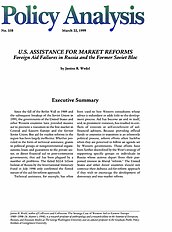Technical assistance, for example, has often been used to hire Western consultants whose advice is redundant or adds little to the development process. Aid has become an end in itself, and, in prominent instances, has resulted in conflicts of interests or self-enrichment of aid-financed advisers. Because providing official funds to countries in transition is an inherently political process, reform efforts often backfire when they are perceived to follow an agenda set by Western governments. Those efforts have been further discredited by the West’s strategy of supporting specific groups or individuals in Russia whose actions depart from their purported interest in liberal “reform.” The United States and other donor countries should not continue their dubious aid-for-reform approach if they wish to encourage the development of democracy and true market reform.
U.S. Assistance for Market Reforms: Foreign Aid Failures in Russia and the Former Soviet Bloc
Since the fall of the Berlin Wall in 1989 and the subsequent breakup of the Soviet Union in 1991, the governments of the United States and other Western countries have provided massive aid to promote a transition to the free market in Central and Eastern Europe and the former Soviet Union. But aid for market reforms in the region has been largely ineffective. Whether provided in the form of technical assistance, grants to political groups or nongovernmental organizations, loans and guarantees to the private sector, or direct financial aid to post-communist governments, that aid has been plagued by a number of problems. The failed $22.6 billion bailout of Russia by the International Monetary Fund in July 1998 only confirmed the flawed nature of the aid-for-reform approach.
About the Author

This work is licensed under a Creative Commons Attribution-NonCommercial-ShareAlike 4.0 International License.
